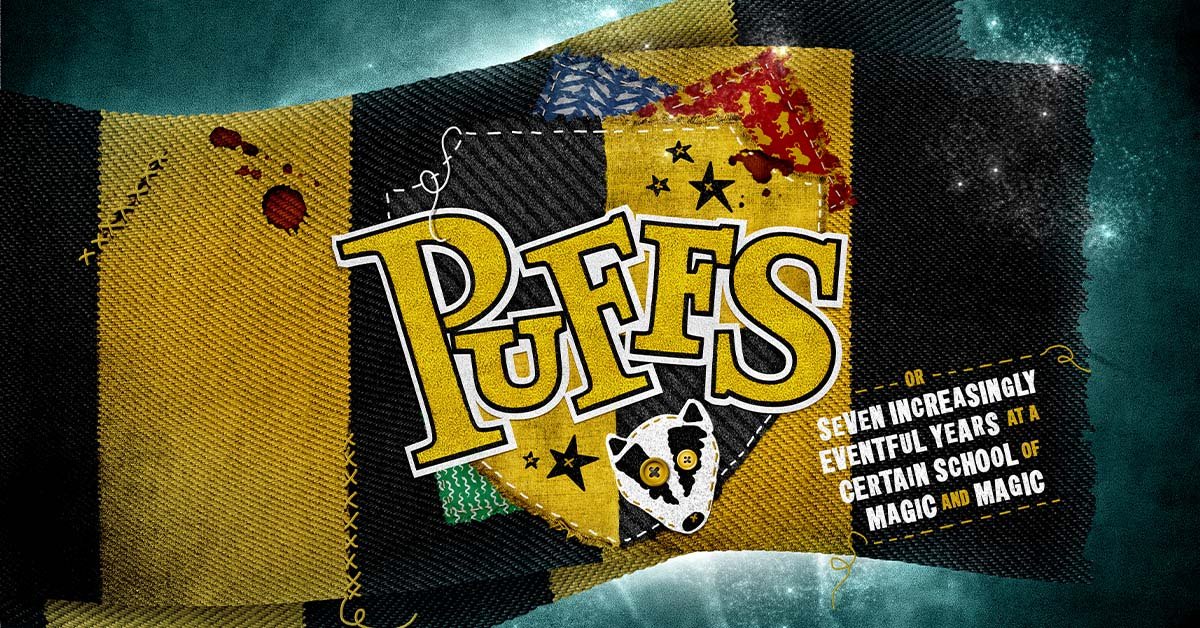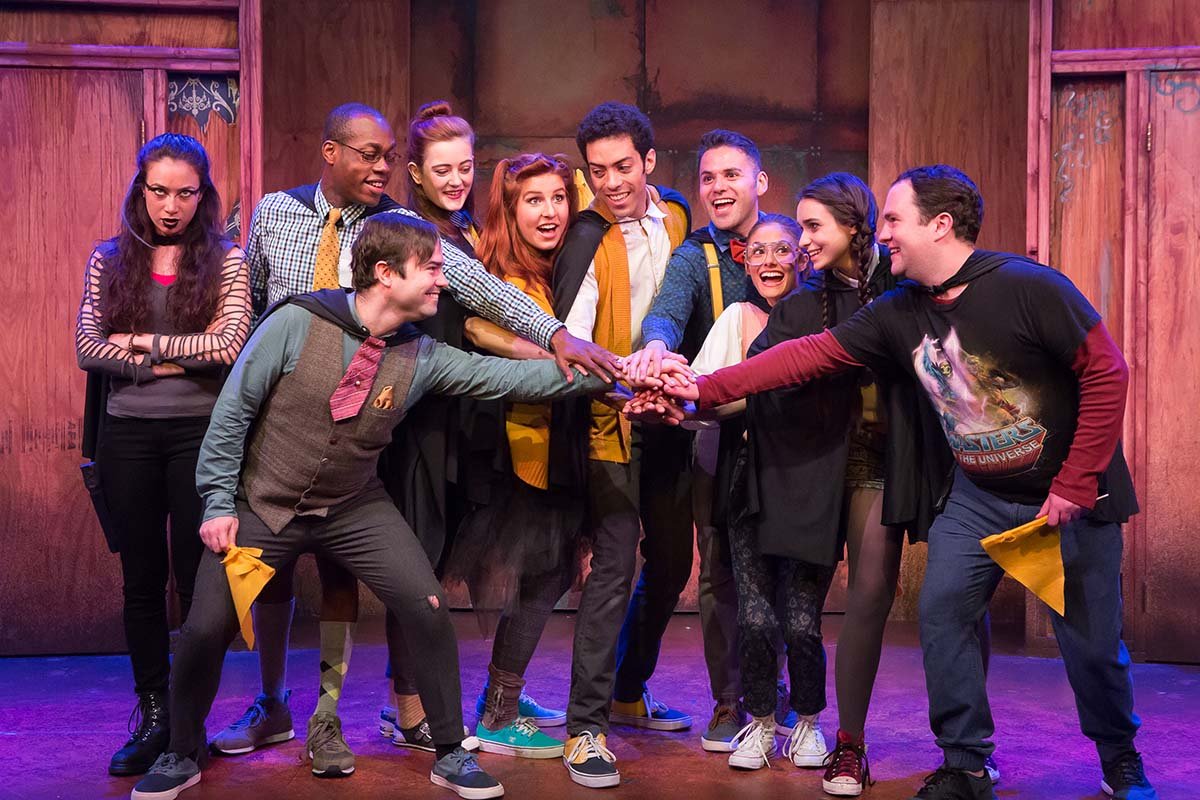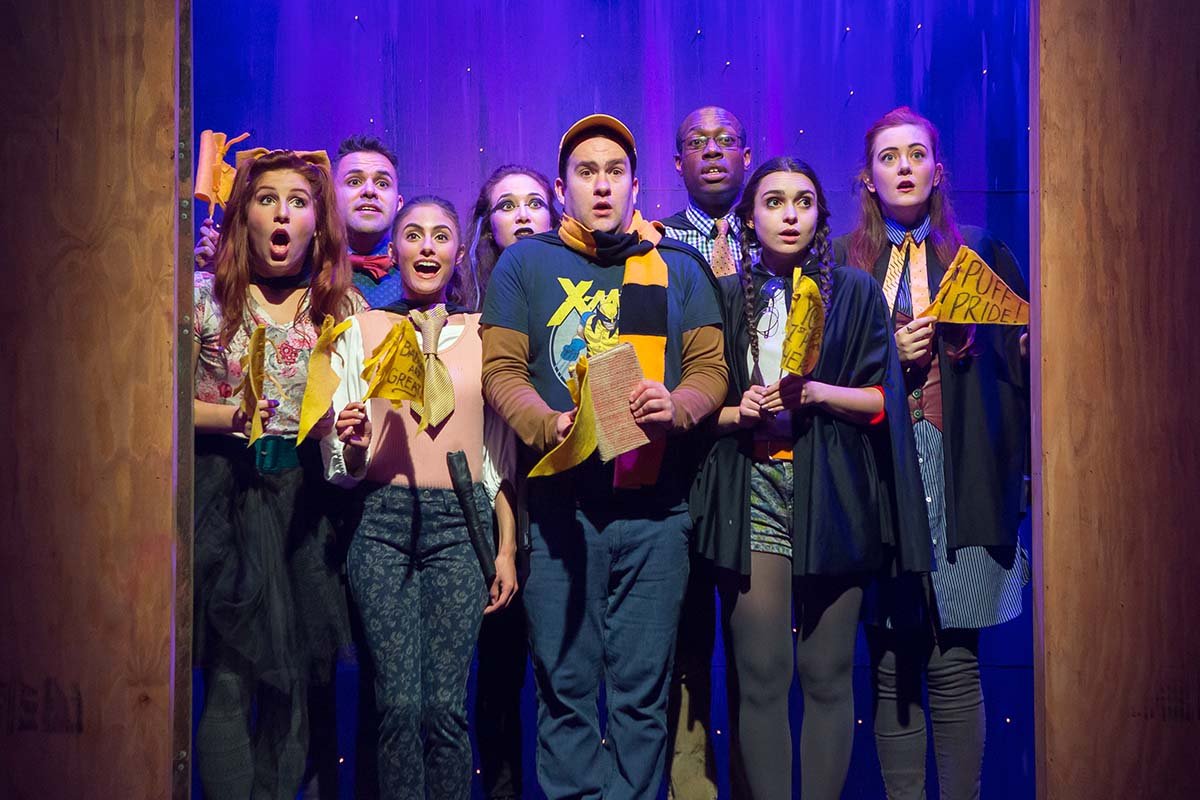
We’re celebrating five years since the premiere of Puffs, a play that illuminates seven increasingly eventful years at a Certain School of Magic and Magic. The show electrified New York City when it opened, and after over 1,000 performances, it continues to enchant theatregoers worldwide.
We caught up with playwright Matt Cox to talk about the play’s inception, inspirations and the enduring spell it casts over artists and audiences alike.
…
Thanks for taking the time to think about Puffs today! As a way to ease folks into the conversation, let’s begin with your inspiration: How did you decide to write about a certain Wizard School?
I was a fan of that particularly similar series of books about a wizard boy growing up while I myself grew up. I attended midnight releases, went to the movies on day one, etc. In 2015-ish I had been living in a lot of my own personal entertainment nostalgia as I had finished my first play, Kapow-i GoGo, which itself was a love letter to much of the other entertainment I devoured when I was a kid (Dragonball Z, Final Fantasy, Star Wars, etc.). Pop culture is a major influence on my work, if that isn’t clear. If it’s got wizards or big swords or robots, I’m sold.
The initial thought that sparked the idea of Puffs was: wouldn’t it have been just so terrible to be one of the many other wizard kids at that particular magic school who were just there to get their standard wizard education. A few quick decisions followed:
-
Such a story would absolutely have to focus on the “Puffs” as, especially in 2015, before pop culture had deemed the house as a whole the “not-so-cool kids of wizard school.” I knew there’d be a lot of relatability to pull from there, not just from my own life, but likely many who would become our audience as well.
-
The title would be Puffs: Seven Increasingly Eventful Years at a Certain School of (witchcraft and wizardry, eventually changed to Magic & Magic.)
-
Ron would be played by a mop. I don’t know why this was one of the first ideas, but I found it silly, and I’m so glad it stuck around. Feel free to always tag me in pictures of your Ron mops. It is a great simple joy.
The show proceeded to grow and change a whole lot from there.
What new take did you hope to bring to a certain boy wizard’s well-developed universe?
I knew there was going to be a lot of fun in approaching this particular story from the sidelines, giving voices and larger personalities to those who were only ever meant to be side characters. There was also something very cool about the idea of basically taking the experience that many within the massive fan community had dreamed about for years and making it a bit more real. The chance to go to that castle. Wayne Hopkins is meant to be all of us who were huddled over those books — putting ourselves in the story.
Also, wizard jokes! This particular world felt ripe for comedy. And I didn’t want to miss the opportunity to make a bunch of my friends run around in wizard capes. I have since made so many people run around in wizard capes — and so that experience of putting oneself into the story has morphed a bit. It’s awesome to hear about how excited some people are to just get a chance to exist as a wizard for a little while.
Puffs is such a joyful, life-affirming show. How did you and the creative team curate such an electric experience for the audience – even for those who might not get every reference?
There was some early concern about audience members feeling “left out” due to the number of specific references. Ultimately, I think Puffs manages to avoid this by being, at its core, a relatable heartfelt story everyone can resonate with. We’ve all been awkward, we’ve all done weird things that still haunt us when our brains drift to it, we’ve all been a little lost — because at some point we’ve all grown up. And we’ve all felt like background characters who can’t catch a break while someone close by seems to have everything going right. You don’t have to know what a squirggleburgleturtle is for that all to be real.
“If you try to please everyone, you likely won’t please anyone…”
Mechanically, the method here was to cram as many jokes and comedy bits in as possible. If you’re not laughing at the wizard reference, hopefully you’re laughing at the other movie reference we made. Or if you don’t like movies, again, you grew up at some point, so hopefully one of the relatable life situations will get you to guffaw a little. If all else fails, let some funny performers make some silly choices. That should work. On the other side of all that, it was important to have some pretty specific references in there as well. We wanted fans to have a “thing” to celebrate. It always felt great when a large chunk of the room cackled at some deep cuts. I think a wonderful bit of validation happens across the room for each audience member when they hear a bunch of people catch that joke they’d think only they might get.
If you try to please everyone, you likely won’t please anyone enough for them to really care about what you’ve made. At least beyond simple enjoyment. We hoped we could get a certain fandom to love us, and hoped that excitement would then spread.
You clearly have an affection for the source material. How did you walk the very fine line between laughing at versus laughing with the original work?
One of my favorite compliments we ever received is that Puffs feels a lot like a group of old friends hanging out a bar, talking about the series a bit and realizing not everything added up as well as it seemed to when they were kids. I did a re-read prior to writing the script and, on top of notating every moment our Puffs appeared, I took note of everything that felt a little extra silly in the world. I knew for much of our potential audience, especially a few years ago, that this story was a major part of their lives and even shaped parts of their personality. It was always meant to be a gentle ribbing — much like the characters of Puffs, nothing came from a place of meanness or hate. The bits all wanted to come from a place of kindness and love.
Aside from the obvious, were there any other inspirations for Puffs’ form or content?
Yes, actually! A small tangent: My career as a writer began creating short scripts for a late-night serialized play competition called #serials@theflea. You’d write a 10-ish minute play in a few days, it’d be rehearsed for two days, teched for half an hour, and performed three nights, at which point the audience would vote for which three plays would return to continue their stories next week, and the cycle would repeat. I wrote two long-running series for this: a fantasy Game of Thrones/Lord of the Rings thing entitled Kings of Crowns and Kapow-i GoGo/Kapow-I GoGo Z (which became my first full-length play).
Puffs was briefly envisioned as one of these serialized plays. It never became one, but the episodic format stuck around in how the years within the story were sectioned off from one another and how to jump around large swaths of time ensuring the audience keeps up. Much of my style comes from the habits I picked up during this time.
At its core, Puffs is a story about kids who are struggling in school — both because they recognize that they’re not heroes, and because adolescence, learning and relationships are challenging to navigate. Are there any moments in the play that really encapsulate this theme for you?
I think the best version of this is the end of year one — where our hopeful heroes have attained their goal… of getting THIRD PLACE in the house cup only to be robbed of that joy by the triumphs of the main characters in that other story, who go from last to first to win it all. This was one of those observations from my re-read that the Puffs were the ones really screwed here. But they don’t stay sad for too long. They know they’ve still got work to do and they have each other to do it.
How did you take Puffs’ trio of main characters – Wayne, Megan and Oliver – and transform their spite towards a certain boy wizard into the substance of a raucous, jovial comedy?
Each of our trio have distinct feelings about and views on the World of Wizards they exist in. The comedy and tragedy all stems from these differences, and the sweetness and heart of these characters comes from how these views converge and change bit by bit as the play goes on.
Wayne comes at everything from a place of excitement. He’s read so many fantasy books. He knows ALL the rules of a good hero’s journey. But nothing plays by those rules.
Oliver takes a practical approach to it all. He craves form and function and expects a society that’s existed for thousands of years to have proper rules. But there’s no formula. Just chaos.
Megan is over all the wizard shenanigans. She’s a capable witch, but the only thing she cares about is hiding who, deep down, she is afraid she is. And to make sure no one finds out, she goes to EXTREMES in every possible other direction.
Piling on their reactions to a certain boy wizard’s exploits is then just icing on the fun cake.
There’s a scene in the play where Wayne, Megan and Oliver are “sending letters” via AOL Instant Messenger. In one of these messages, there’s this surprisingly tragic moment where Wayne talks about his Uncle Dave dying. “It was sudden and weird,” Wayne says. “Weird because I don’t think anybody cared? No one really knew him. I barely even did. At the end he was just some dead… unimportant guy.” Why include this glimpse of very real grief in an otherwise buoyant play?
The word “important” was settled on as, well, important for the show. It pops up in a few key moments, leading up to the scene in the white room where Headmaster #2 ruminates on the value of “importance.”
We knew we’d want some semblance of usage of the word here. The scene, and the sudden death of dear Uncle Dave, provided an opportunity to herald the encroaching darker tone. It also gave Wayne a reason to reaaaaaaaaaallllllly need that Cedric win in the tournament, paving the way for more darkness.
In the past five years since the off-Broadway premiere of Puffs, have there been any productions – or particular performances – that stand out to you?
Seeing a production of Puffs on the stage at Sachse High School, my own high school, was a real stand out life moment. There was certainly some time for self reflection on unexpected career paths and whatnot with that one. (Big thanks to my teachers Libby Nelson and Joe Murdock for making that happen!)
There’s something terrific about meeting and seeing casts put together for the show and how they all have very Puff-y qualities. I mean this in the best way – they always tend to be a delightful group of weirdos.
One Redditor describes seeing Puffs as one of the “funniest experiences of my adult life.” What do you think makes the show resonate so widely?
I think Puffs offers a pretty comprehensive experience and a lot of surprises – leading to a more heartfelt outpouring of love for the show. There’s many many bits, and loads and loads of heart, the combination of which is maybe not always expected when someone is walking into the theater at the beginning of the night. It’s easy to expect a lighthearted evening of silly wizard jokes (and it maybe would have been a much easier show to make) — so that we go to some darker, more thoughtful places amongst the zaniness makes the evening more of a meal. I do think there’s something for everyone here!
Plus, I do think there’s some good bits in there. Specifically some great references to Rocky IV. Everyone loves the Rocky IV bits. Please don’t tell me otherwise.
How have you changed as an artist since Puffs’ off-Broadway premiere? What did you learn from writing and staging the piece?
The entire process of Puffs has been one of change for me. It was only my second full-length play, so I was constantly learning about my own voice and how to best get across all those hopes and dreams into the text. I spent several of the years we were off-off and off-Broadway honing and refining it as I grew as a writer. Each time we moved venues we’d do an update to the script — just ideas that had popped into my head after hearing the play to many times. We also added in some variant lines — which began as a little gift to those audience members we had who were showing up to the theater over and over again. I liked that it’d be a slightly different experience for those fans every time — which is a lesson I’ve brought into much of my work since. Valuing the experiences of your fans allows room to grow well beyond what one might think they are capable of.
“Valuing the experiences of your fans allows room to grow well beyond what one might think they are capable of.”
Puffs ends on the note that we’re all both important and unimportant. What do you hope folks who read, produce or witness the play take away from its story?
Our tagline off-Broadway was that Puffs was “A Play for Anyone Never Destined to Save the World.” That is very much still the case. I hope it can help people recognize the value of the story that is their own lives and I hope they see how much that story matters to all the people around them, even if it feels like you’re overshadowed by whatever circumstance out there. I believe that can translate to those performing the show as well – no matter how big or small, how technical or made-of-cardboard it is – everything you’re doing is going to really matter to someone out there.
The story of how the show came to be encapsulates this too. Puffs started as a small project made by a bunch of friends with a plan to run for two weeks at a comedy theater. We hoped the show could maybe, just maybe, make some people laugh and maybe, just maybe, extend for another whole two whole weeks after that and be done forever. That we were a fixture there for several months, ventured off-Broadway after that, played for almost 1,000 performances at the Elektra and New World Stages, were filmed and screened in movie theaters, then appeared on stages in other continents, and then so so many high schools and regional spaces is genuinely unbelievable. And I think a couple of people have even laughed! We didn’t think much of ourselves, but it all clicked in a big way for many people – and the story we all got together to tell went to places exceeding anything we could have thought possible. It’s all genuinely very cool.
…
Puffs is available to perform as a one- or two-act play and is available in both formats “for Young Wizards.” To license a production of Puffs, click here. To purchase copy of the script, click here.
To discover more transfixing plays and musicals, visit Concord Theatricals in the US or UK.

Comedy Mysteries: Gasps, Laughs and Thrills

A Children’s Theatre Classic: An Interview with Snow White And The Seven Dwarfs Composer Michael Valenti



